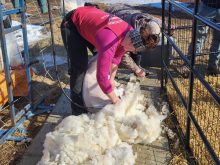RED DEER – Neil Wagstaff has seen his share of crises on the farm.
A full-time farmer since1988 in central Alberta, the president of the Wild Rose Agricultural Producers has experienced pestilence, tornadoes and record low commodity prices.
He is beginning to wonder how long any farmer can continue.
“There are farms that are well-established that are expressing concern about the viability of their operations,” said Wagstaff in an interview following the Wild Rose annual meeting held in Red Deer Jan. 11-12.
While many young farmers struggle and give up he is equally concerned about third and fourth generation farmers who have eroded their equity and life savings to keep their farms going.
Read Also

Charges laid after cattle theft
Saskatchewan RCMP lay two charges against a man after six cattle went missing.
As a small general farm organization, Wild Rose has to pick its battles to survive.
A good place to start could be during the next provincial election expected this spring. Agriculture was almost invisible during the federal election.
Wagstaff wants Alberta farmers to unite and make sure their concerns are heard. As the province’s population becomes more urbanized, this could be the last election where rural constituencies outnumber urban ones.
Farmers need their own platform going into the next provincial election and it will take a united effort by all Alberta farm organizations to show the government they have a common cause.
The first step is educating politicians and the public about what is really going on in agriculture.
“Unless we get public sentiment on our side, we are really going to be fighting a tough battle because we’re such a small population,” Wagstaff said.
Shrinking farm income, escalating energy costs and the struggle to maintain private property rights are among his concerns. The most serious issues are the farm income crisis and need for better safety nets.
Net Income Stabilization Accounts may be the program with the most potential to offer long-term stability. Some minor changes to NISA are needed rather than an entirely new program, he said.
“I wish we had good times to improve our safety nets rather than bad ones,” he said.
The plight of the primary grain producer is especially worrisome and needs the most attention.
“The grain sector must get some sort of a deficiency payment with a recognition that it is being delivered because of the impact of other countries’ subsidies on our market,” he said.
Increasing conflict over development is changing the face of Alberta, he said. Economic growth is hurting rural communities because much of the industrial activity, like oil and gas work, is happening on farmland.
“Private property rights and trespass are going to become more significant to us,” said Wagstaff.
“The frenzied activity in the oil and gas industry in this province is causing more and more conflicts between surface owners and farm operators.”

















